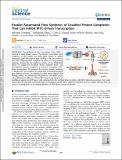| dc.contributor.author | Pomplun, Sebastian | |
| dc.contributor.author | Jbara, Muhammad | |
| dc.contributor.author | Schissel, Carly K | |
| dc.contributor.author | Wilson Hawken, Susana | |
| dc.contributor.author | Boija, Ann | |
| dc.contributor.author | Li, Charles | |
| dc.contributor.author | Klein, Isaac | |
| dc.contributor.author | Pentelute, Bradley L | |
| dc.date.accessioned | 2022-03-15T19:04:49Z | |
| dc.date.available | 2022-03-15T19:04:49Z | |
| dc.date.issued | 2021 | |
| dc.identifier.uri | https://hdl.handle.net/1721.1/141204 | |
| dc.description.abstract | Dysregulation of the transcription factor MYC is involved in many human cancers. The dimeric transcription factor complexes of MYC/MAX and MAX/MAX activate or inhibit, respectively, gene transcription upon binding to the same enhancer box DNA. Targeting these complexes in cancer is a long-standing challenge. Inspired by the inhibitory activity of the MAX/MAX dimer, we engineered covalently linked, synthetic homo- and heterodimeric protein complexes to attenuate oncogenic MYC-driven transcription. We prepared the covalent protein complexes (∼20 kDa, 167-231 residues) in a single shot via parallel automated flow synthesis in hours. The stabilized covalent dimers display DNA binding activity, are intrinsically cell-penetrant, and inhibit cancer cell proliferation in different cell lines. RNA sequencing and gene set enrichment analysis in A549 cancer cells confirmed that the synthetic dimers interfere with MYC-driven transcription. Our results demonstrate the potential of automated flow technology to rapidly deliver engineered synthetic protein complex mimetics that can serve as a starting point in developing inhibitors of MYC-driven cancer cell growth. | en_US |
| dc.language.iso | en | |
| dc.publisher | American Chemical Society (ACS) | en_US |
| dc.relation.isversionof | 10.1021/ACSCENTSCI.1C00663 | en_US |
| dc.rights | Creative Commons Attribution-NonCommercial-NoDerivs License | en_US |
| dc.rights.uri | http://creativecommons.org/licenses/by-nc-nd/4.0/ | en_US |
| dc.source | ACS | en_US |
| dc.title | Parallel Automated Flow Synthesis of Covalent Protein Complexes That Can Inhibit MYC-Driven Transcription | en_US |
| dc.type | Article | en_US |
| dc.identifier.citation | Pomplun, Sebastian, Jbara, Muhammad, Schissel, Carly K, Wilson Hawken, Susana, Boija, Ann et al. 2021. "Parallel Automated Flow Synthesis of Covalent Protein Complexes That Can Inhibit MYC-Driven Transcription." ACS Central Science, 7 (8). | |
| dc.contributor.department | Massachusetts Institute of Technology. Department of Chemistry | |
| dc.contributor.department | Massachusetts Institute of Technology. Center for Environmental Health Sciences | |
| dc.contributor.department | Koch Institute for Integrative Cancer Research at MIT | |
| dc.contributor.department | Whitehead Institute for Biomedical Research | |
| dc.contributor.department | Massachusetts Institute of Technology. Department of Biology | |
| dc.relation.journal | ACS Central Science | en_US |
| dc.eprint.version | Final published version | en_US |
| dc.type.uri | http://purl.org/eprint/type/JournalArticle | en_US |
| eprint.status | http://purl.org/eprint/status/PeerReviewed | en_US |
| dc.date.updated | 2022-03-15T19:01:33Z | |
| dspace.orderedauthors | Pomplun, S; Jbara, M; Schissel, CK; Wilson Hawken, S; Boija, A; Li, C; Klein, I; Pentelute, BL | en_US |
| dspace.date.submission | 2022-03-15T19:01:36Z | |
| mit.journal.volume | 7 | en_US |
| mit.journal.issue | 8 | en_US |
| mit.license | PUBLISHER_CC | |
| mit.metadata.status | Authority Work and Publication Information Needed | en_US |
